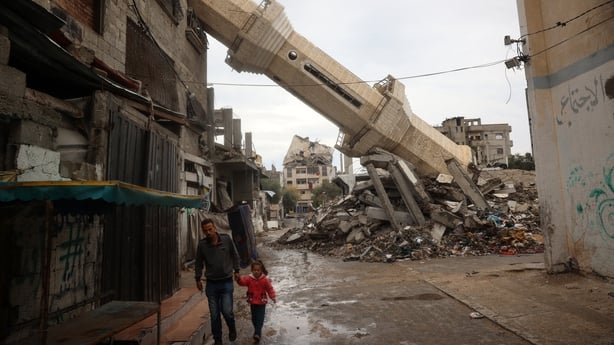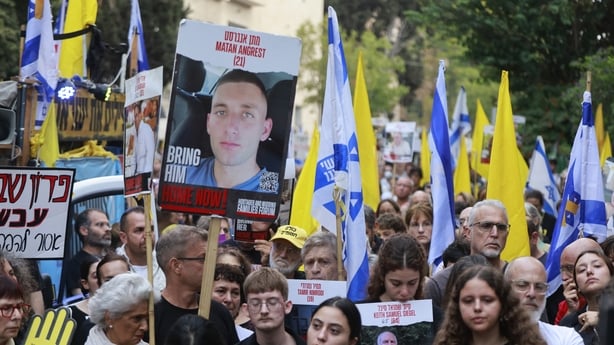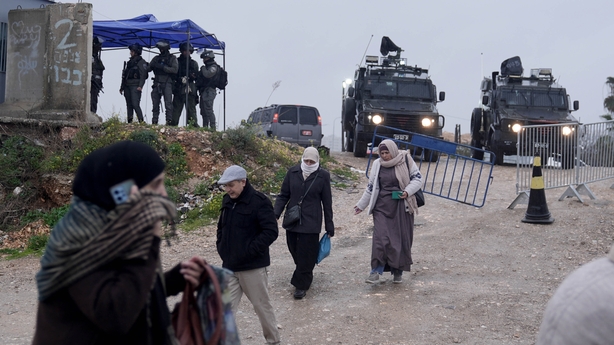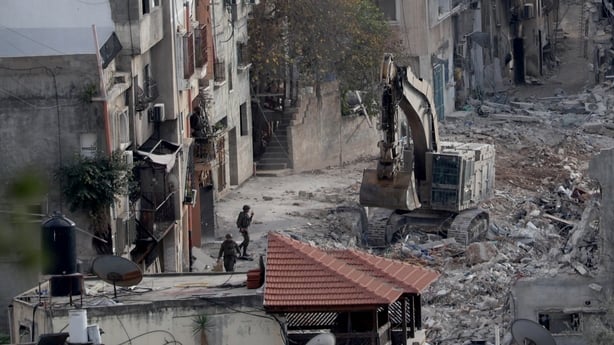An Israeli drone strike has killed two people in Gaza, local Palestinian medical authorities said, amid uncertainty about a fragile ceasefire deal that has halted fighting in the enclave for weeks.
The Palestinian health ministry and officials at the Al-Ahly hospital said the Israeli strike hit the Shejaia area of Gaza City.
The Israeli military said the drone struck a group of suspected militants operating near its troops in northern Gaza and planting an explosive device in the ground, but gave no details on casualties.
"Earlier today, several terrorists were identified operating near IDF troops and planting an explosive device in the ground in northern Gaza," the military said in a statement, adding an Israeli warplane struck the "terrorists in order to remove the threat".

A similar incident yesterday killed three people.
The Israeli military said this strike also targeted individuals seen planting a bomb near Israeli troops.
The military, under new army chief Lieutenant General Eyal Zamir, has made preparations for a return to war in Gaza, if no agreement can be reached with Hamas on extending the 42-day ceasefire agreed last month.
Israel's new military chief has been visiting troops since assuming command of the Israel Defence Forces this week.
But with a visit in coming days from US President Donald Trump's special Middle East envoy Steve Witkoff, who has held direct talks with Hamas, there has been no indication that Israel has given up on continuing the ceasefire.
A delegation from Hamas arrived in Cairo for talks with Egyptian mediators who have been helping facilitate the talks along with officials from Qatar, aiming to proceed to the next stage of the deal, which could open the way to ending the war.

A Hamas official said: "The delegation will meet with Egyptian officials on Saturday to discuss the latest developments, assess progress in implementing the ceasefire agreement, and address matters related to launching the second phase of the deal."
In an apparent effort to pressure Israel, Hamas released a video showing Israeli soldier Matan Angrest, who is one of 59 Israeli and foreign hostages still held in Gaza.
The militant group also urged US President Donald Trump to meet Palestinian prisoners freed during the ongoing truce in Gaza, following his meeting with released Israeli hostages.
Just as he spoke of the "unbearable suffering" of Israeli hostages, the US president should "show the same level of respect to freed Palestinian political prisoners and allocate time to meet and listen to their stories", senior Hamas leader Basem Naim wrote in an open letter addressed to Mr Trump.
More than 9,500 Palestinian prisoners were currently being held in Israeli prisons, he said.
In the Oval Office yesterday, Mr Trump met with eight former Israeli hostages who were released as part of the truce agreement that took effect on 19 January.
Despite a number of hitches, the ceasefire has largely held, allowing the exchange of 33 Israeli hostages and five Thai captives for around 2,000 Palestinian prisoners and detainees.
In late November 2023, 105 hostages had already been freed during a one-week truce in exchange for 240 Palestinian prisoners.
But it is unclear whether talks to release the remaining hostages and complete the Israeli withdrawal will go ahead, despite pressure from Mr Trump, who has demanded that Hamas handover all those still held or face devastating consequences.
Israel has demanded the return of its hostages and an extension of the truce through the Muslim holy month of Ramadan until after the Jewish Passover holiday in April.
But it has refused to agree to opening talks that would cover issues including the final withdrawal of its troops from Gaza and a post-war administration for the enclave.
Hamas's attack on Israel resulted in the deaths of 1,218 people, mostly civilians, according to official figures.
Israel's retaliatory military offensive has killed at least 48,446 people in Gaza, the majority of them civilians, according to the Hamas-run territory's health ministry.
The United Nations considers these figures reliable.
Ramadan

In Jerusalem, the first Friday in Ramadan saw thousands enter the walled Old City to pray at al-Aqsa mosque, with Israel allowing a limited number of older Palestinians and children from the occupied West Bank to cross into the city.
"We have not come for three or four years but thank God for the happiness and joy that we were able to reach Al-Aqsa mosque, this is the greatest joy for Muslims," said Salah Aleiwi, who came in from the West Bank.
The mosque, on a site in Jerusalem's Old City that Jews call the Temple Mount and revere as the site of two ancient temples, is a holy place for both religions and has long been a focus for clashes that have at times spiraled into wider conflict.
Tensions in the West Bank have risen amid a weeks-long Israeli operation against Palestinian refugee camps where troops have demolished dozens of houses and destroyed roads and other infrastructure, sending tens of thousands of camp residents out of their homes.

Israel said the operation is directed against Iranian-backed Palestinian militant groups entrenched in the camps.
There was a heavy deployment of police in the narrow-cobbled streets of the Old City but no reports of serious trouble.
"The Israeli police are spread out across Jerusalem and across Israel in order to allow the safe environment for the arrival of all these worshippers coming here," police spokesperson Dean Elsdunne said.
In recent years, Israeli authorities have regularly restricted access to the mosque compound, citing security needs, and entry today was conditional on approval from police, even for those qualified by age.
Ibtisam Abdul Fattah, a 65-year-old from the West Bank, said she had been turned back twice at the West Bank checkpoint of Qalandiya, just north of Jerusalem.
"We are in our land but we are not allowed," she said.

